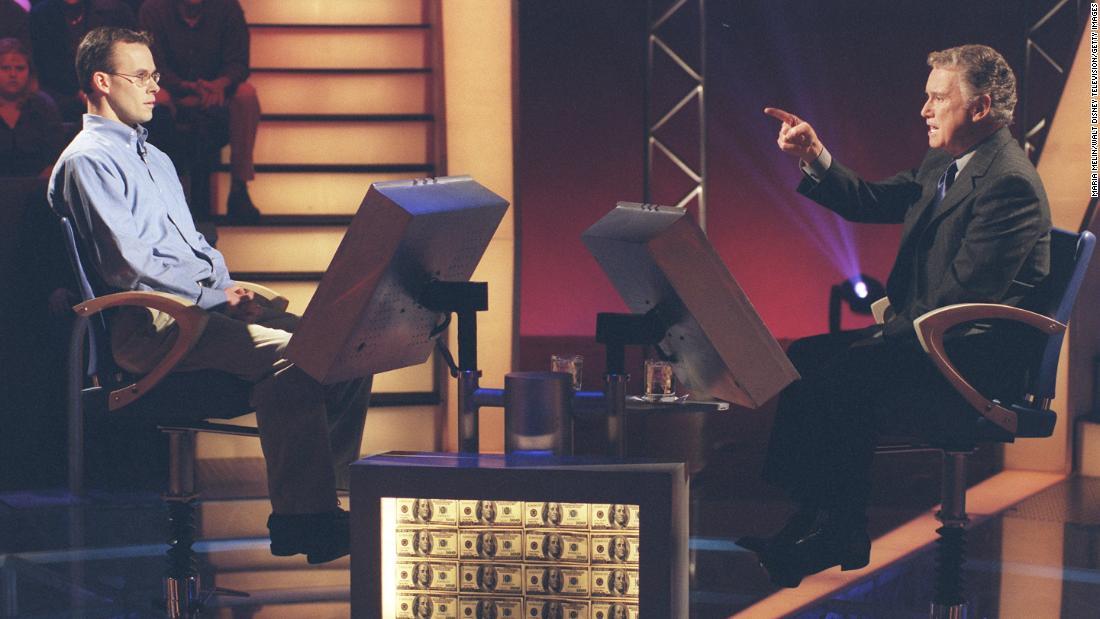[ad_1]
The stakes were clearly low. The entire budget for the 13-episode run was $1.8 million, a figure that, even back then, amounted to loose change in a network programming budget. But the stakes were certainly high for one man, Michael Davies, the program’s executive producer, because he had literally walked away from a job as an ABC programming executive to take the reins of the show.
“I had staked everything on it,” Davies said this week. “I loved my job with ABC. I just felt compelled to do this.”
But in the middle of the run, when he trudged to his subway station in lower Manhattan each morning, he started overhearing encouraging conversations. People at newsstands and on the crowded subway platforms were talking excitedly about how the contestant the previous night had fared, how Doug from West Virginia had answered that tricky question, how tense it was when he risked his previous winnings to go for the $250,000 question. Suddenly, everybody was talking about “Who Wants to Be a Millionaire?”
Davies did not care about the lack of sleep nor his empty bank account. He had a hit show on his hands. Actually, he had a phenomenon on his hands.
The two-week run of “Who Wants to Be a Millionaire?” which began exactly 20 years ago on Friday, captivated the country, zooming to ratings not seen in the summer months in a generation, and transforming ABC from a gasping network to a ratings powerhouse.
But Davies came from the UK; he was born in London and attended the University of Edinburgh. He knew that inventive programming was emerging all across British television, and he couldn’t understand why some of it wouldn’t work in the US. He heard the dismissive explanations: these shows didn’t have stars and great writing; they were filled with ordinary people. And he didn’t think that made any sense.
“There was very little variety on American television,” Davies said. “Millionaire” was a spectacular format, he believed, because it restored drama to the game format, something games had in the ’50’s (though of course some of that drama was manufactured by producers who rigged the outcomes — a scandal that inspired the Oscar-nominated “Quiz Show”). Unlike more recent iterations of TV games, “Millionaire” wasn’t loud, in its colors, its music, its garish sets. Instead it was intimate, “a game in close-up,” Davies said. And the contestants were just folks, not Columbia University professors.
How formidable was that format? International editions of “Millionaire” began to sprout all over the globe, growing to 20 nations, then 40, then more. In almost every location, “Millionaire” became a top-rated show. It even spawned the plot of an Oscar-winning movie, “Slumdog Millionaire.”
ABC quickly recognized a goose that could produce laid advertising gold and pushed Davies to produce three episodes a week that next winter, then up again to four per week the season after that. Everybody knows what happened next: the show burned down the flame of national passion in under three years. Meredith Viera and others hosted a weekday syndicated version of the show, but the original never came back in prime time on ABC.
But Davies noted that in that short time he produced 363 prime-time editions of the show. “How many shows get to 363 episodes?” he asked. The show continued in a syndicated version in America until this past May. The rest of the world is still watching, though. It is now seen in 123 countries, according to Sony Pictures Entertainment, which now syndicates the format.
The birth of a genre
What may be ultimately more significant about this anniversary, though, is the association of “Millionaire” with the genre that came to be known as reality television. It is more common to tie the start of that genre to the introduction of “Survivor” on CBS the following summer. (Coincidentally, that format, again created by a British television company, was also first championed by Davies, who matched up the format with the perfect producer, his fellow Brit, Mark Burnett, and advocated that ABC pick it up. With “Millionaire” all over its schedule, the network passed.)
Davies argues that “Millionaire” is distinct from many of the reality show formats that have followed it because of its roots in classic television game shows. But he knows the show’s outsized success opened network minds to the concept of unscripted formats starring everyday people—and if they came with an imported label, all the better.
“Survivor” begat “Big Brother,” which begat “The Bachelor,” which begat “American Idol,” which begat “The Apprentice,” the reality talent show that starred now-US president Donald Trump.
Not that it’s fair to draw a direct line from “Who Wants to Be a Millionaire” to Trump’s election as President of the United States.
“The President was never on ‘Millionaire,’ ” Davies said, wryly, as though the question has come up before. The game show was always “a place for all kinds of different people,” he added. In other words, contestants were cast neither for looks nor a nasty capacity to play the “villain.”
“The point of the show was very unifying,” Davies says. “There was never any confrontation.”
Davies himself has explored other realms of unscripted television in his post-“Millionaire” career, including working as executive producer of the late-night show “Watch What Happens Live,” with Andy Cohen, and performing on the panel of the soccer commentary show, “Men in Blazers.”
But he recognized the personal significance of that Monday 20 years ago. “I owe everything to ‘Millionaire,’ he said. “It changed my career. It changed my life.
[ad_2]
Source link




